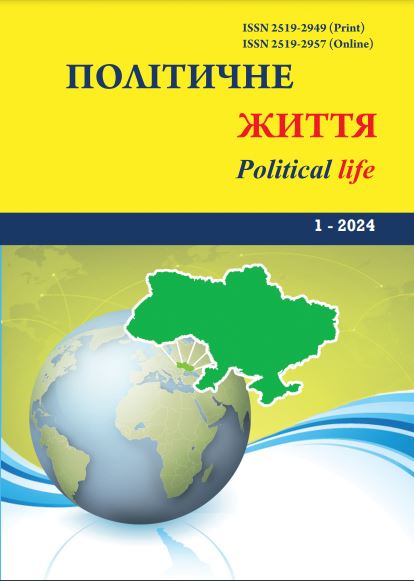Self-government as a factor of development сivil society in the Republic of Poland
DOI:
https://doi.org/10.31558/2519-2949.2024.1.4Keywords:
civil society; non-governmental sector; principle of subsidiarity; District Councils; local identity; Institute for Legislative Initiatives; Voivodeship Social Protection CommitteeAbstract
The article shows that an important element for the spread of civic activity and the development of civil society is the development of self-government in local governments. Local self-government and civil society are independent institutions, but they influence each other. There is no full-fledged modern civil society without a well-functioning system of institutional self-government. Just as there is no effective local
self-government without its strengthening through cooperation with civil society institutions. In addition, local self-government cannot adequately fulfill its social tasks without applying the principle of subsidiarity. The reasons for the weakness of civil society in Poland are identified.
At the same time, it is noted that the reform of local self-government, general elections to local
self-government bodies, the introduction of the institute of citizens’ legislative initiative, the introduction of the so-called participatory budget and the introduction of a referendum demonstrate the great importance of these new forms of democracy for the development and functioning of civil society.
A sociological analysis of the civil positions of Poles leads to the conclusion of significant social passivity of citizens, and therefore, the weakness of Polish civil society.
It is stated that the quintessence of the idea of civil society is the belief that life in a democratic state, in which most issues are decided by the majority united in political parties, should not lead to apathy and alienation of citizens from public life, but rather there should be mechanisms for the development of civic prestige and social self-organization independent of the actions of the political apparatus of the modern state.
References
Aneta Gawkowska, Piotr Gliński, Artur Kościański red., Teorie wspólnotowe a praktyka społeczna. Obywatelskość, polityka, lokalność, Wydawnictwo IFiS PAN, Warszawa 2005, s. 146-175.
Barbara Imiołczyk i Jerzy Regulski oraz inni, Samorządność i demokracja lokalna, Raport Konwersatorium Doświadczenia i Przyszłość, nr 2/2007, Warszawa, listopad 2007 r., s. 8-9.
McLean, George. Freedom, Cultural Traditions and Progress. Philosophy in Civil Society and Nation Building: Tashkent Lectures. Washington, D. C. The Council for Research in Values and Philosophy, 2000. 186 р.
Paweł Sarnecki, Idea samorządności w strukturze społeczeństwa obywatelskiego, w: Zbigniew Witkowski, Agnieszka Bień-Kacała red., Samorząd w Konstytucji RP z 2 kwietnia 1997 roku, Toruń 2013, TNOiK, s. 25.
Popay, J., A. Rogers and G. Williams (1998). ‘Rationale and Standards for the Systematic Review of Qualitative Literature in Health Services Research’, Qualitative Health Research, 8 (3), pp. 341-351.
Makowski G. Obywatelska inicjatywa uchwałodawcza – prawo i praktyka, 2011, http://www.academia.edu/4497022/Obywatelska_inicjatywa_uchwalodawcza_-_prawo_i_praktyka.
Krasnowolski A. (2014), Społeczeństwo obywatelskie i jego instytucje, Kancelaria Senatu, Biuro Analiz I Dokumentacji, Warszawa 2014, https://www.senat.gov.pl/gfx/senat/pl/ senatopracowania/58/plik/ot-_627_internet.pdf.
Rosmini Antonio. The Philosophy of Politics. Volume 2. Society and its Purpose. Rosmini House. Durham. 1994. 455 p.
Demokracja bezpośrednia w procesie kształtowania społeczeństwa obywatelskiego w Polsce, Wydawnictwo Sejmowe, Warszawa 2010, s. 60 i nast.
Dębicki, M. Referendum: iluzja czy realność bezpośredniej demokracji, „Rzeczpospolita” z 6.12.1995 r., s. 16, cyt. za M. Rachwałd, op. cit. s.91-92.
KONSTYTUCJA RZECZYPOSPOLITEJ POLSKIEJ z dnia 2 kwietnia 1997 r. URL: https://isap.sejm.gov.pl/isap.nsf/download.xsp/WDU19970780483/U/D19970483Lj.pdf
https://obywateledecyduja.pl/2012/05/wywiad-z-dr-piotrem-uzieblo/#more-385
Grabowska M. (red.), Społeczeństwo obywatelskie w Polsce A.D. 2012, seria „Opinie i Diagnozy” nr 22, CBOS, Warszawa 2012.
Piotr Gliński, Style działań organizacji pozarządowych w Polsce. Grupy interesu czy pożytku publicznego?, Wydawnictwo IFiS PAN, Warszawa 2006.
Jerzy Szacki red., Ani książę, ani kupiec: obywatel, Wydawnictwo Znak, Kraków 1997, s. 5-6.
Marcin Rachwał w: Demokracja bezpośrednia w procesie kształtowania społeczeństwa obywatelskiego w Polsce, Wydawnictwo Sejmowe, Warszawa 2010, s. 60 i nast.

